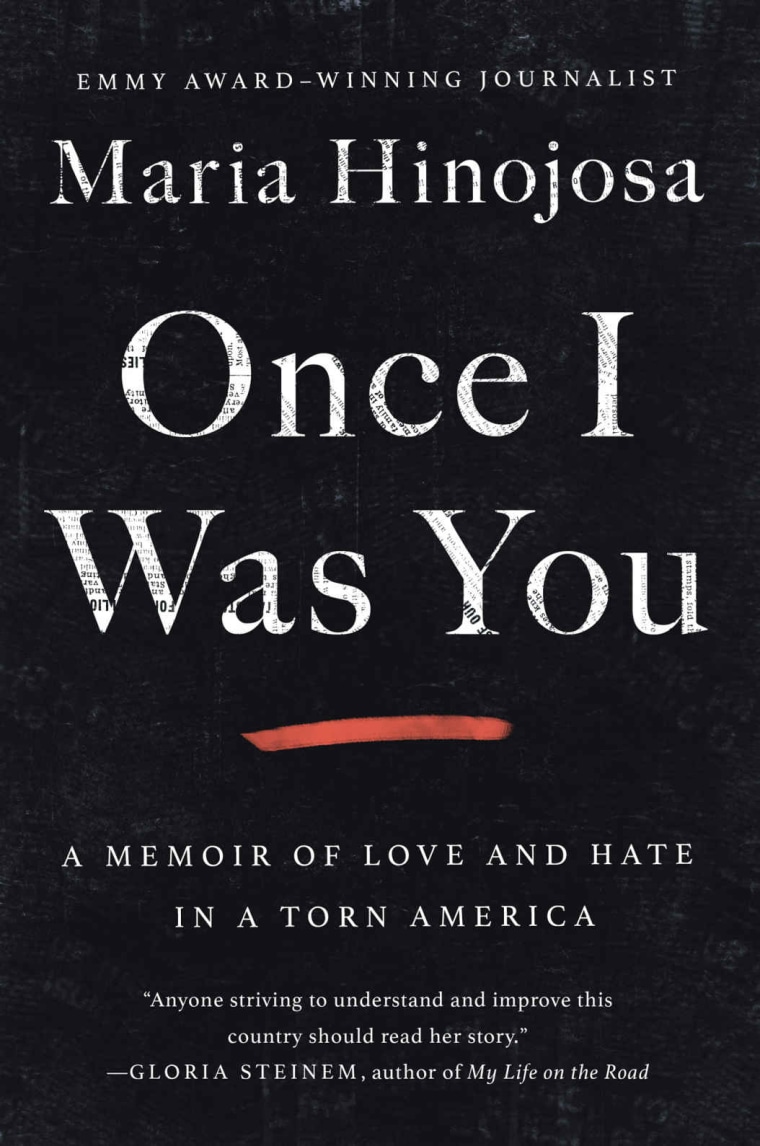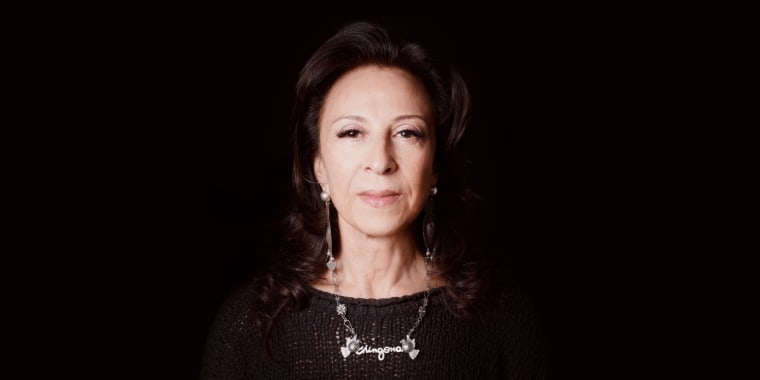Maria Hinojosa may be one of the country's most well-known and respected Latina journalists, but as she describes in her highly acclaimed, recently published memoir, her path to success was not a given.
"I’m not sure I get you,” a director told Hinojosa after an audition when she was a young aspiring actress, informing her she was not white enough, not Mexican enough, not tall enough, not short enough, not street enough and not sophisticated enough. He warned her that “the industry” would likely not get her either.
Her acting aspirations began to wane that day, but they were superseded by a drive to become a voice for the Latino community and to inform audiences about the changing political and social landscape of the country. Now Hinojosa, 59, reflects on her storied, and sometimes stormy, career in her book, “Once I Was You: A Memoir of Love and Hate in a Torn America.”
“When you put a book like this out in the world, you worry that nobody would care,” Hinojosa tells NBC News. “As it happens, there has been a snowball effect. So many people have contacted me or reached out on social media to tell me they relate to the story, or that it resonates with them. It means a lot to me, especially since I really haven’t left my apartment in Harlem in months.”

Both Hinojosa and her husband, artist German Pérez, recovered from the coronavirus earlier this year.
Writing a book is a solitary experience, Hinojosa noted, so she has missed the experience of doing live readings and appearances.
“That is reality now, but it has been a hard pill to swallow. I am a people person; I am a hugger,” says Hinojosa, who has stayed busy with virtual events, but has missed the “community-building” experience of connecting with readers in person.
In “Once I Was You,” Hinojosa unspools a story that is uniquely her own. Born in Mexico City, the future host of NPR's “Latino USA” came to the United States in 1962 with her family and grew up in Chicago. After attending Barnard College, where she hosted a late-night radio show, she began her career at NPR before going on to report for PBS, CBS and CNN.
Hinojosa does not shy from examining the most private, traumatic moments of her life. At 16, she was raped, an experience that led to physical intimacy issues in her adult life. When she was hired at CNN, she heard colleagues refer to her “air of entitlement,” belittle her as “Bronx Bureau chief,” and call her an affirmative action hire.
After extensively covering 9/11, Hinojosa suffered from post-traumatic stress disorder. What she termed her “silent addiction to being on TV” nearly broke up her family and her marriage (even her husband called her a diva, she said). Just before starting her successful nonprofit media company, Futuro Media, she was over 40, with no agent, and contemplating going on unemployment.
For Hinojosa, revisiting such old wounds was emotional. “Yet it was cathartic, to get things off my chest. I had good times and bad times, and they were formative moments in my life as a journalist. That’s why I wanted to be clear what the ups and downs of this kind of life looks like, whether it is ‘Imposter Syndrome’ or just the pressure of being the first," she said. "Sharing my insecurities is a way to remind people that we go through the same things.”
Hinojosa’s long career has been, in some ways, a continual juxtaposition of achievement and everyday struggle. While starting out at NPR as a freelancer, she worked as a waitress to make ends meet — meaning that she would sometimes hide in the kitchen when NPR correspondents came into the restaurant for dinner.
At CBS News, she wrote commentary for Walter Cronkite and earned personal praise from him. It was at this same job that a female executive gave her the once-over in the elevator and declared, “Wow, you look so tribal.”
It was relatively late in her career that Hinojosa began to truly believe in herself. “I had to stop fighting against everyone and every institution. I had to change the way I was fighting,” she writes. “Needing constant validation from the men and institutions around me in order to feel good enough was tiring. I never felt good enough, always like an imposter. I had to go through hell to get to the other side.”
Interspersed with her own story, Hinojosa recounts modern American immigration history, from the Bracero Program (1942) to the Trump administration’s zero-tolerance immigration policy. Publishers Weekly termed “Once I Was You” a “powerful memoir that doubles as an essential immigration primer.”
The title of the book comes from an encounter Hinojosa had at the height of the Trump administration's family separations policy. She had a brief conversation in the McAllen, Texas, airport with a young girl who was being transported by an organization hired by the government. Hinojosa’s last words to her were, “I see you — because once I was you.”
Fighting "incorrect narratives"
Surveying today’s media landscape, Hinojosa has mixed feelings. On the one hand, she offered, there are more jobs and opportunities for Latino journalists. But most newsrooms are still not diverse — a study by Hofstra University in 2019 found that Latinos accounted for 8.8 percent of staff in non-Spanish language TV stations — and there is great competition for jobs that do exist.
“In some ways, it is harder than when I was starting out,” she observed. “There is more knowledge about our communities (out there) but there are also incorrect narratives about our communities that we have to deconstruct, and un-create."
More than ever, Hinojosa is proud of her own newsroom, which she said is growing. “There is more demand for our content, and we are expanding our reach, we are going gangbusters. Our “In The Thick” podcast has been popular, and we are hiring more people, not laying people off.”
“These have been very dark times for our country,” Hinojosa says. “But I think that one of the lessons of 2020 is that we’re stronger than we think we are. Whether it is taking to the streets for social justice, or just living through coronavirus, we have more capacity to survive than we imagine. And we need to care about each other enough to make things better – because only we can save each other and transform this country.”
Follow NBC Latino on Facebook, Twitter and Instagram.


